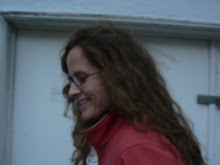Anyway, snowshoe hares change from brown to white during winter. The color change takes about a month, which can make hares a target for predators during early snowfall (and they are still brown) or late snowfall; the hares turn completely white by late November. Heinrich wonders if the hares know about their color change, that they are practically invisible once they are white. Heinrich writes, "I doubt that a hare knows whether or not it is invisible because the totally white hares I've seen on brown background made no apparent effort to hide" (26). I couldn't help but think about Rilke's "The Eighth Elegy," which addresses how, according to Rilke, animals aren't encumbered by death because they, more or less, aren't hampered by the world. He establishes the idea of the Open, an eternal/God-type realm, a forward sort of place that isn't the future. We are so apart of the world, we think, that when we die we leave this world. Only when we are close to death are we over it. Rilke writes, "For close to death one sees death no longer/ and stares out instead, perhaps with the wide gaze of animals" (lines 22-23). Rilke couldn't be talking about any real animals, just the animals of example, eating their berries and nibbling their hind quarters until they get hit by a car or something. Who can say what animals are and aren't aware of, but the idea that on the animals v. human scale, one of us contributes to a cycle of life while the other takes the Harold and Maud approach, to live life to the fullest because you aren't going to be around forever. Sounds as though it were freeing, right? But we know it's just a confident sort of fear, a fear with tree planting and hearse stealing...
Heinrich often reminds me that the chipmunks and the snowshoe hares will be eaten, will be the winter meal of another animal desperate to overload on calories before cozying up with its young somewhere safe. Have a listen to "The Eighth Elegy" by Rainer Maria Rilke, from his Duino Elegies translated by Edward Snow.




No comments:
Post a Comment